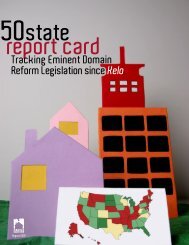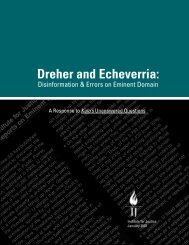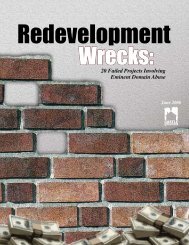<strong>Public</strong> <strong>Power</strong>, <strong>Private</strong> <strong>Gain</strong>Legislative ActionsIn 1999, the Colorado state legislature amended the state Urban Renewal Law in a way that significantlystrengthened the rights of property owners within areas targeted for “blight” designation. <strong>The</strong> amendmentrequires that a municipality determine that a property satisfies four out of 12 different blighting factorsbefore it may declare an area subject to urban renewal and condemnation. <strong>The</strong> previous law required thatonly one blighting factor be met. 96 State Representative Andy McElheny first proposed the new, morerestrictive blight standards after reading about a case in which a Denver suburb threatened to condemnO’Meara Ford so that it could transfer the property to another private enterprise (see below). 97<strong>Private</strong> Use CondemnationsArvada<strong>The</strong> Arvada Urban Renewal Authority designated the Water Tower area as blighted and approved a plan forupscale residential development. According to one of the citizens protesting the plan, the area contained220 rental units and 32 homes, with approximately 500 to 600 residents. <strong>The</strong> head of the agency stated inFebruary 2000 that it would attempt to purchase the properties, but it would condemn if anyone asked fortoo much money. 98 (Presumably it would also condemn if someone refused to move for any amount ofmoney). Although news reports do not indicate how many homes Arvada actually condemned, a letter to theeditor a few months later comments on the fact that houses were condemned and demolition had begun. 99Arvada had also been conducting a land use study about the possibility for development just beyond itsborders. When it asked for citizen input, the citizens of the Berkeley Village mobile home park realizedtheir homes had been listed as a possible development area for Arvada. As the president of the BerkeleyNeighborhood Association explained, residents had been watching the Water Tower project “getting ready tocondemn homes by right of eminent domain – and we figured if they can do it there, they’ll do it here aswell.” Anxious residents began calling Arvada, and after the calls started, Arvada issued a letter reassuringthe Berkeley residents that it would not annex them. 100Aurora<strong>The</strong> City of Aurora is developing Aurora City Center, a new civic and commercial center that will rise wherethe Florence Gardens neighborhood once stood. <strong>The</strong> centerpiece of City Center will be a 600,000-squarefoot, pedestrian-oriented shopping center anchored by Super Target and Barnes & Noble. Aurora will alsouse some of the space for a new city hall and other municipal offices. In order to consolidate the 67 acresneeded for the new development, the City created an urban renewal district encompassing all of FlorenceGardens, and declared that it would use condemnation “if necessary” to force area landowners to sell toMiller Weingarten, the private developer involved in the project. 101 This impacted 20 properties, mostlyvacant lots. 102 As of the last report, the owners were unhappy that the City was taking their property for96 Colo. Rev. Stat. § 31-25-103(2) (1999).97 Rob Gurwit, “Land Grab,” Governing, Jan. 2001, at 26; see also “Government as Land-Grabber,” <strong>The</strong> American Enterprise, June 2001, at 57.98 Gary Gerhardt, “Residents Seek More Input in Arvada Renewal Plan,” Rocky Mountain News, Feb. 3, 2000, at 29A.99 Letters Page, Rocky Mountain News, May 18, 2000, at 55A.100 Gary Gerhardt, “Berkeley Village Won’t be Annexed,” Rocky Mountain News, March 20, 2000, at 24A.101 Dina Berta, “Aurora Negotiating for Retail Center; Developer Envisions Shopping, Restaurants North of Mall in VacantUrban Renewal District,” Rocky Mountain News, Mar. 4, 2000, at 2B.102 John Rebchook, “Developer a Leader of New Urbanism; Miller Weingarten Takes a Low-Profile Approach to High-Profile Projects,” Rocky Mountain News, Mar. 18, 2001, at 1G.Colorado39
<strong>Public</strong> <strong>Power</strong>, <strong>Private</strong> <strong>Gain</strong>another private party and also unhappy with the offers made by thedeveloper to purchase the property. 103 <strong>The</strong> project has now gone forward,104 but news reports do not indicate whether property was condemnedor the owners agreed to sell under threat of condemnation.AuroraIn December 2002, the Aurora City Council approved a measure thatwill force almost 60 “undesirable and nonconforming” businesses in theneighborhood surrounding the Fitzsimons medical campus to redeveloptheir property to uses compatible with other redevelopment projectsspringing up around the multimillion-dollar biomedical research sciencepark. Among the businesses impacted by the new law are hotels, gasstations, liquor stores, mobile home parks and apartment buildings. Ifbusiness owners within the targeted area do not bring their propertiesinto conformance with the City Council’s desired uses within 10 years,the City could take them without compensation. This procedure, knownas “amortization,” is the City’s chosen method of redeveloping the area,because the cash-strapped local government does not have the moneyto condemn the properties outright and pay the owners’ fair marketvalue and relocation expenses. Many owners are outraged that amortizationwill burden them with all the costs of converting their properties,with no compensation at all from the City. 105 For example, Cathy Lundy,who owns Luster Car Wash, just spent hundreds of thousands of dollarsrebuilding and improving her business in May 1998. She says thatunder the City’s plan she cannot possibly recoup that investment withinthe 10-year time limit. Also, says Lundy, “<strong>The</strong>re is no way we canbecome conforming; a car wash is a car wash.” 106Lundy, along with the owners of nine single-family homes in the targetedarea, managed to secure an exemption from the City Council that allowsthem to keep their properties without having to bring them into conformancewith the City’s plans. Other owners, however, were not so lucky.Paul Thompson must change his apartment building and kick out the 50low-income, disabled seniors who currently live there. An additional 450elderly residents live in the four mobile home parks that must close with-103 Sean Kelly, “Property Owners Angry at Aurora; Offers Called Unfair for TownCenter Land,” Denver Post, Aug. 1, 2001, at B2.104 Rachel Brand, “Shops and Restaurants to Be Center Attraction; Complex atthe Heart of Aurora Has Been 20 Years in Making,” Rocky Mountain News, Sept.19, 2002, at 2B.105 Sheba R. Wheeler, “Renewal Divides Aurora, Residents; Owners Near Fitz Get10 Years to Conform,” Denver Post, Dec. 4, 2002, at B1.106 Mike Patty, “Plan: 10 Years to Shape Up; Businesses Around FitzsimonsArgue Zoning Law Is Unfair,” Rocky Mountain News, Jan. 7, 2003, at 14A.Recent ColoradoCourt DecisionsLimit the Rights ofCountiesand Individuals toChallenge MunicipalUrban RenewalPlansIn the past few years, severalactions have been brought byColorado taxpayers seeking tooverturn urban renewal planspassed by municipalities in thatstate. <strong>The</strong> Boards ofCommissioners from both Boulderand Adams counties, along withan individual taxpayer, challengedan urban renewal plan that theCity of Broomfield had approvedafter determining that the targetedarea was blighted. <strong>The</strong>y tried tosue under the Colorado Taxpayers’Bill of Rights, 1 arguing thatbecause the Broomfield planinvolved a reallocation of propertytaxes, it amounted to a tax policychange and thus should havebeen put to a vote of the electorate.2 <strong>The</strong> Boulder commissionersalso alleged that the plan wasinvalid because Broomfield violatedthe state Urban Renewal Act byfailing to adequately include theCounty in an advisory role duringthe process of formulating theplan. 3 <strong>The</strong> Colorado Court ofAppeals ruled in November 1999that both suing parties lackedstanding to challenge theBroomfield plan. <strong>The</strong> individualtaxpayer had not asserted a legallycompensable injury, because theplan provided for proportionaladjustments of the amount paid tothe renewal agency in the event of40
- Page 2 and 3: Foreword by Douglas W. Kmiec“Gove
- Page 4 and 5: Missouri 117Montana 124Nebraska 126
- Page 6 and 7: Mississippi Supreme Court Strengthe
- Page 8 and 9: Public Power,Private Gainby Dana Be
- Page 10 and 11: A Few Examples of the Abuse ofEmine
- Page 12 and 13: The Eminent Domain Process andthe O
- Page 14 and 15: depends on a particular location. S
- Page 16 and 17: Changes and AdditionsThe informatio
- Page 18 and 19: Public Power, Private GainThe Alaba
- Page 20 and 21: Public Power, Private GainLegislati
- Page 22 and 23: Public Power, Private GainLegislati
- Page 24 and 25: Public Power, Private GainPhoenixIn
- Page 26 and 27: Public Power, Private GainPrivate U
- Page 28: Public Power, Private GainLegislati
- Page 31 and 32: Public Power, Private Gainaccording
- Page 33 and 34: Public Power, Private GainAt trial,
- Page 35 and 36: Public Power, Private GainYasin’s
- Page 37 and 38: Public Power, Private GainGarden Gr
- Page 39 and 40: Public Power, Private GainIn the en
- Page 41 and 42: Public Power, Private Gainonly to h
- Page 43 and 44: Public Power, Private GainUnder the
- Page 45: Public Power, Private GainKnown Con
- Page 49 and 50: Public Power, Private Gainrent hike
- Page 51 and 52: Public Power, Private GainKnown Con
- Page 53 and 54: Public Power, Private Gainfamilies
- Page 55 and 56: Public Power, Private Gainbusinesse
- Page 57 and 58: Public Power, Private GainAfter the
- Page 60 and 61: Public Power, Private GainLegislati
- Page 62 and 63: Public Power, Private GainCoolidge-
- Page 64 and 65: Public Power, Private GainThis Rivi
- Page 66 and 67: Public Power, Private GainGeorgiaOv
- Page 68 and 69: Public Power, Private GainLegislati
- Page 70 and 71: Public Power, Private GainWith grea
- Page 72 and 73: Public Power, Private GainLegislati
- Page 74 and 75: Public Power, Private GainGateway c
- Page 76 and 77: Public Power, Private GainGovernmen
- Page 78 and 79: Public Power, Private GainIndianaKn
- Page 80 and 81: Public Power, Private Gainaction, e
- Page 82 and 83: Public Power, Private GainKnown Con
- Page 84 and 85: Public Power, Private GainDemolitio
- Page 86 and 87: Public Power, Private GainPrivate U
- Page 88 and 89: Public Power, Private GainKnown Con
- Page 90 and 91: Public Power, Private Gain“excess
- Page 92 and 93: Public Power, Private GainNewportA
- Page 94 and 95: Public Power, Private GainPrivate U
- Page 96 and 97:
Public Power, Private GainMaineKnow
- Page 98 and 99:
Public Power, Private GainTown Lear
- Page 100 and 101:
Public Power, Private GainBaltimore
- Page 102 and 103:
Public Power, Private GainKnown Con
- Page 104 and 105:
Public Power, Private GainPittsfiel
- Page 106 and 107:
Public Power, Private GainSBC and M
- Page 108 and 109:
Public Power, Private GainLegislati
- Page 110 and 111:
Public Power, Private GainUnder the
- Page 112 and 113:
Public Power, Private Gainprivate p
- Page 114 and 115:
Public Power, Private GainKnown Con
- Page 116 and 117:
Public Power, Private GainIn Septem
- Page 118 and 119:
Public Power, Private GainThe prope
- Page 120 and 121:
Public Power, Private GainKnown Con
- Page 122 and 123:
Public Power, Private GainAfter the
- Page 124 and 125:
Public Power, Private GainMissouriK
- Page 126 and 127:
Public Power, Private GainVacate Yo
- Page 128 and 129:
Public Power, Private GainThe Thoms
- Page 130 and 131:
Public Power, Private Gaintoday onl
- Page 132 and 133:
Public Power, Private GainThe Monta
- Page 134 and 135:
Public Power, Private GainPrivate U
- Page 136 and 137:
Public Power, Private GainKnown Con
- Page 138 and 139:
Public Power, Private GainOn March
- Page 140 and 141:
Public Power, Private GainLegislati
- Page 142 and 143:
Public Power, Private GainLegislati
- Page 144 and 145:
Public Power, Private GainLocal Opp
- Page 146 and 147:
Public Power, Private GainAtlantic
- Page 148 and 149:
Public Power, Private GainNeighbors
- Page 150 and 151:
Public Power, Private GainNew Mexic
- Page 152 and 153:
Public Power, Private GainLegislati
- Page 154 and 155:
Public Power, Private GainThe price
- Page 156 and 157:
Public Power, Private GainAfter a h
- Page 158 and 159:
Public Power, Private Gainproject.
- Page 160 and 161:
Public Power, Private GainWilliam B
- Page 162 and 163:
Public Power, Private GainKnown Con
- Page 164 and 165:
Public Power, Private GainKnown Con
- Page 166 and 167:
Public Power, Private GainKnown Con
- Page 168 and 169:
Public Power, Private GainAfter two
- Page 170 and 171:
Public Power, Private GainAround Ci
- Page 172 and 173:
Public Power, Private Gainland, the
- Page 174 and 175:
Public Power, Private GainEuclid Ci
- Page 176 and 177:
Public Power, Private GainKnown Con
- Page 178 and 179:
Public Power, Private GainOregonKno
- Page 180 and 181:
Public Power, Private GainPennsylva
- Page 182 and 183:
Public Power, Private Gainsion requ
- Page 184 and 185:
Public Power, Private GainThe Mayor
- Page 186 and 187:
Public Power, Private GainHome Depo
- Page 188 and 189:
Public Power, Private Gain…only t
- Page 190 and 191:
Public Power, Private GainRhode Isl
- Page 192 and 193:
Public Power, Private GainOut With
- Page 194 and 195:
Public Power, Private GainAlthough
- Page 196 and 197:
Public Power, Private GainOverviewS
- Page 198 and 199:
Public Power, Private GainPrivate U
- Page 200 and 201:
Public Power, Private GainTexasKnow
- Page 202 and 203:
Public Power, Private GainNo Good D
- Page 204 and 205:
Public Power, Private GainPrivate U
- Page 206 and 207:
Public Power, Private GainKnown Con
- Page 208 and 209:
Public Power, Private GainApparentl
- Page 210 and 211:
Public Power, Private Gainback, but
- Page 212 and 213:
Public Power, Private GainLafayette
- Page 214 and 215:
Public Power, Private GainKnown Con
- Page 216 and 217:
Public Power, Private Gainfamilies.
- Page 218 and 219:
Public Power, Private GainWashingto
- Page 220 and 221:
Public Power, Private GainPrivate U
- Page 222 and 223:
Public Power, Private GainWisconsin
- Page 224 and 225:
Public Power, Private GainWyoming l
- Page 226 and 227:
landowner may also sell an easement
- Page 228:
efore the person must leave, but bu





